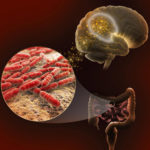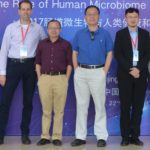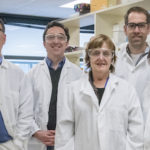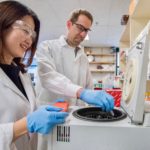A team of researchers from two U.S. Department of Energy national laboratories has found new evidence of tangible connections between the gut and the brain. The team, led by Antoine Snijders at Berkeley Lab and Janet Jansson at Pacific Northwest National Laboratory (PNNL), identified lactate—a molecule produced by all species of one gut microbe—as a key memory-boosting molecular messenger. The work was published in the journal BMC Microbiome.
Microbiome Signature Could Predict Post-op Enterocolitis in Hirschsprung Disease Patients
Biosciences Area researchers, in collaboration with colleagues at Nanjing Medical University in China, performed the first study to prospectively investigate the gut microbiome in relation to Hirschsprung-associated enterocolitis (HAEC), a leading cause of death in Hirschsprung disease patients. They identified a microbiome signature that might predict the development of postoperative HAEC. In addition, they found that exclusive breastfeeding might reduce the risk of HAEC through modulation of the intestinal microbiome.
New Round of Funding for Thirdhand Smoke Research
 Berkeley Lab thirdhand smoke researchers have been awarded a new three-year grant totaling $904,744. The funding from the Tobacco-Related Disease Research Program (TRDRP) will support translational studies aimed at mitigating health impacts of exposure to thirdhand smoke (THS)—the toxic residues from tobacco smoke that linger on indoor surfaces and in dust long after a cigarette has been extinguished. From the Biosciences Area, Biological Systems and Engineering (BSE) Division staff scientist Bo Hang will serve as principal investigator on the studies, with senior scientist Jian-Hua Mao and staff scientist Antoine Snijders, also of BSE, as co-investigators. Collaborators on the project include staff scientist Hugo Destaillats and retiree affiliate Lara Gundel in the Energy Technologies Area (ETA) at Berkeley Lab, as well as researchers at California Consortium on Thirdhand Smoke partner institutions UC San Francisco and UC Riverside.
Berkeley Lab thirdhand smoke researchers have been awarded a new three-year grant totaling $904,744. The funding from the Tobacco-Related Disease Research Program (TRDRP) will support translational studies aimed at mitigating health impacts of exposure to thirdhand smoke (THS)—the toxic residues from tobacco smoke that linger on indoor surfaces and in dust long after a cigarette has been extinguished. From the Biosciences Area, Biological Systems and Engineering (BSE) Division staff scientist Bo Hang will serve as principal investigator on the studies, with senior scientist Jian-Hua Mao and staff scientist Antoine Snijders, also of BSE, as co-investigators. Collaborators on the project include staff scientist Hugo Destaillats and retiree affiliate Lara Gundel in the Energy Technologies Area (ETA) at Berkeley Lab, as well as researchers at California Consortium on Thirdhand Smoke partner institutions UC San Francisco and UC Riverside.
KDM5 Deficiency Alters Gut Microbiome, Social Behavior in Flies
Genome-wide association (GWAS) and familial studies have found mutations that disrupt the function of KDM5 proteins in patients with autism spectrum disorders and related intellectual disabilities. Biological Systems and Engineering (BSE) Division researchers Jian-Hua Mao, Antoine Snijders, and Susan Celniker, in collaboration with a team of scientists led by Xingyin Liu at Nanjing Medical University (NMU) in China, used genetic tools in Drosophila to delineate how KDM5 contributes to autism and intellectual disability.
A New Mouse Model for Studying Stomach Cancer
An international team led by researchers in Berkeley Lab’s Biosciences Area has identified a new laboratory mouse strain for studying gastric cancer. The mouse lineage is part of a population called the Collaborative Cross (CC) mouse model that was bred to have greater genetic diversity than previous populations, so as to be more comparable with humans. The team monitored hundreds of mice from different CC strains for one year and observed that one line spontaneously developed tumors—stomach and lymphoid being the most prevalent types—at an extremely high rate. Subsequent genetic analysis of the tumors in this cancer-prone line revealed that an inflammatory response regulating a protein called Nfκb1 could be a key driver of cancer susceptibility in this mouse model.
Read more in the Berkeley Lab News Center.
Was this page useful?








